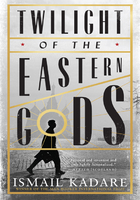In the evening Donal went again to the home-farm. Finding himself alone in the drawing-room, he walked out into the old garden.
"Thank God," he said to himself, "if my wife should come here some sad, sweet night, with a low moon-crescent, and a gently thinking wind, and wander about the garden, it will not be to know herself forgotten!"
He went up and down the grassy paths. Once again, all as long ago--for it seemed long now--he was joined by Miss Graeme.
"I couldn't help fancying," she said as she came up to him, "that I saw lady Arctura walking by your side.--God forgive me! how could I be so heartless as mention her!"
"Her name will always be pleasant in my ears," returned Donal. "I was thinking of her--that was how you felt as if you saw her! You did not really see anything, did you?"
"Oh, no!"
"She is nearer me than that," said Donal. "She will be with me wherever I am; I shall never be sad. God is with me, and I do not weep that I cannot see him: I wait; I wait."
Miss Graeme was in tears.
"Mr. Grant," she said, "she is gone a happy angel to heaven instead of a pining woman! That is your doing! God bless you!--You will let me think of you as a friend?"
"Always; always: you loved her."
"I did not at first; I thought of her only as a poor troubled creature! Now I know there was more life in her trouble than in my content. I came not only to love her, but to look up to her as a saint: if ever there was one, it was she, Mr. Grant. She often came here after I showed her that poem. She used to walk here alone in the twilight. That horrid Miss Carmichael! she was the plague of her life!"
"She was God's messenger--to buffet her, and make her know her need of him. Be sure, Miss Graeme, not a soul can do without him."
Here Mr. Graeme joined them.
"I do not think the earl will last many days," said Donal. "It would be well, it seems to me, at once upon his death to take possession of the house in the town. It is the only property that goes with the title. And of course you would at once take up your abode in the castle! You will find in the earl's papers many proofs, I imagine, that his son has no claim. I would have a deed of gift drawn up, but would rather you seemed to come in by natural succession. We are not bound to tell the world everything; we are only bound to be able without shame to tell it everything. And then I shall have a favour to ask: Morven House, down in the town, is of no great use to you: let me rent it of you. I should like to live there and have a school, with Davie for my first pupil. When we get another, we will try to make a man of him too. We will not care so much about making a great scholar, or a great anything of him, but a true man. We will try to help the whole man of him into the likeness of the one man."
Here Mr. Graeme broke in.
"You will never make a living that way!" he said.
Donal opened his eyes and looked at him. Like one convicted and ashamed, the eyes of the man of business fell before those of the man of God.
"Ah," said Donal, "you have not an idea, Mr. Graeme, on how little I could live!--Here, you had better take the will," he added, pulling it from his pocket.
Mr. Graeme hesitated.
"If you would rather not, I will keep it. I would throw it in the fire, but either you or I must keep it for a time as against all chances."
Mr. Graeme took it.
That night the earl died.
Donal wrote to Percy that his father was dead. Two days after, he appeared. The new earl met him in the hall.
"Mr. Graeme," said Percy,--"I am lord Morven, Mr. Graeme," returned his lordship.
The fellow said an evil word, turned on his heel, and left them to bury his father without him.
The funeral over, the earl turned to Donal and looked him in the face: they walked back to the castle arm in arm, and from that moment were as brothers.
Earl Hector did nothing of importance without consulting Donal, and Donal had the more influence both with landlord and tenants that he had no interest in the property.
The same week he left the castle, and took possession of Morven House. The people said Mr. Grant had played his cards well: had they known what he had really done, they would have called him a born idiot.
Davie, to whom no calamity could be overwhelming so long as he had Mr. Grant, accompanied him gladly, more than content to live with him till he went to college, whither the earl wished to send him.
Donal hindered rather than sped the day. When it came, the earl would have had him go too, but Donal would not.
"I have done what I can," he said. "It is time he should walk alone."















